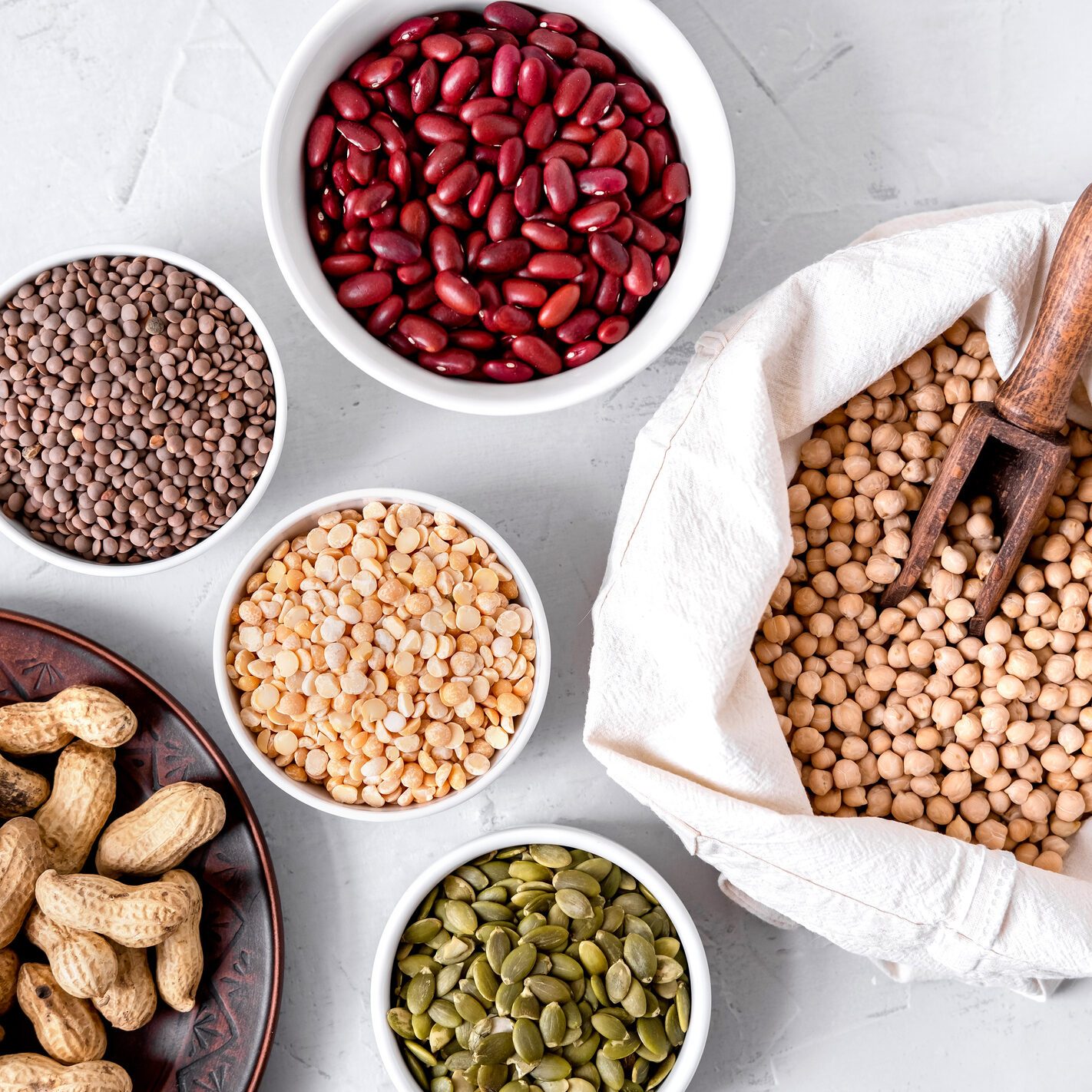Need extra protein in your diet that's not just red meat or chicken breasts? Luckily, there are plenty of legumes, seeds, grains and more to pack in the grams.

13 Surprising Foods that Are High in Protein


Lentils
Lentils can be added to just about any dish—from hearty stews to burritos—and pack 9 grams of protein per 1/2-cup serving. These legumes come in red, black, brown and green varieties. They’re all nutrient-dense with a list of impressive benefits, including being high in fiber and low in calories.

Chickpeas
You might already love chickpeas in hummus, but there’s so much more that these beans can do! If you can believe it, one cup of chickpeas (aka garbanzo beans) has 39 grams of protein. Try roasting them with your choice of spices for a light and crunchy snack or make them the center of dinner in a coconut ginger stir-fry.

Peanuts and Peanut Butter
Popular in your classic PB&J sandwich, Thai dishes and, of course, peanut butter dessert recipes, peanuts and peanut butter are great sources of protein. Just make sure your peanut butter is 100% nuts without any additives so you’re getting all the nutritional benefits minus the extra sugar! One cup of peanuts has 28 grams of protein in it, and two tablespoons of peanut butter provide 8 grams of protein.

Black Beans
Black beans are versatile and slightly sweet compared to more buttery white beans. They have 8 grams of protein per serving and are also jam-packed with fiber and potassium. Health-ify your brownies by adding a can of black beans, or try classic black bean enchiladas or hearty black bean burgers for dinner.

Wild Rice
Swap out your regular jasmine or brown rice for something on the wild side. Wild rice is higher in protein than other rice grains at 6.5 grams per one cup of cooked rice. It has a slightly chewy texture and nutty flavor, making it delicious in wild rice soup.

Chia Seeds
Chia seeds may be small, but they are mighty when it comes to nutrients. For reference, a single serving of these seeds equals almost 5 grams of protein. Add them to your morning bowl of oatmeal for extra protein and omega-3 fatty acids, or layer them up in a parfait with berries for a sweet treat. There are so many ways to power up with chia seeds!

Oats
Oats are usually known for their fiber content, but this classic breakfast offers protein, too. One cup of cooked oats has about 6 grams of protein. Stir in a little peanut butter and sprinkle with chia seeds, and you’re on your way to a meatless breakfast with enough protein to keep you feeling full all morning long.

Almonds
Almonds are rich in protein and vitamin E, which are essential for healthy skin, hair and nails. Grab them by the handful for a snack on the go, add them to fresh salad recipes instead of croutons. Almonds provide 7 grams of protein per 1/4 cup serving.

Pumpkin Seeds
Pumpkin seeds, also known as pepitas, are a tasty and easy snack you can enjoy all year long. One cup of these yummy seeds has 12 grams of protein for you. In autumn, roast your own pumpkin seeds at home for a special treat. They’re also great sprinkled on soups, stews and casseroles.

Eggs
Eggs are a quick and easy way to add vegetarian protein to your diet, whether you’re on the go or looking for a filling snack. There are 6 grams of protein in one whole egg. If you’re in a hurry, hard-boiled eggs or pre-made egg bites are an excellent choice. For breakfast options, you can’t go wrong with scrambled eggs, omelets or huevos rancheros.

Quinoa
Quinoa is a nutty seed that tastes like a grain. It’s rich in protein, fiber and folate. One cup packs 8 grams of protein. Try swapping your usual side dish for quinoa patties, or make it the main event with a filling quinoa salad. Quinoa in breakfast bowls rivals any version made with potatoes!

Cottage Cheese
Cottage cheese is a protein powerhouse with 25 grams per cup. Try topping a bowl with fresh berries for a quick breakfast or snack. You can also use cottage cheese in many of your favorite recipes to pack in extra protein and calcium. Start your day with fluffy blintz pancakes, then whip up these healthy spinach and broccoli enchiladas for dinner.

Edamame
Edamame are young soybeans that can be enjoyed boiled or steamed. One cup of edamame has 17 grams of protein, and there are countless ways to enjoy this tasty snack. Sprinkle cooked edamame with sea salt for a fun appetizer. Toss them in the air fryer for a satisfying crunch or blend them up with tahini for a green take on hummus.




















